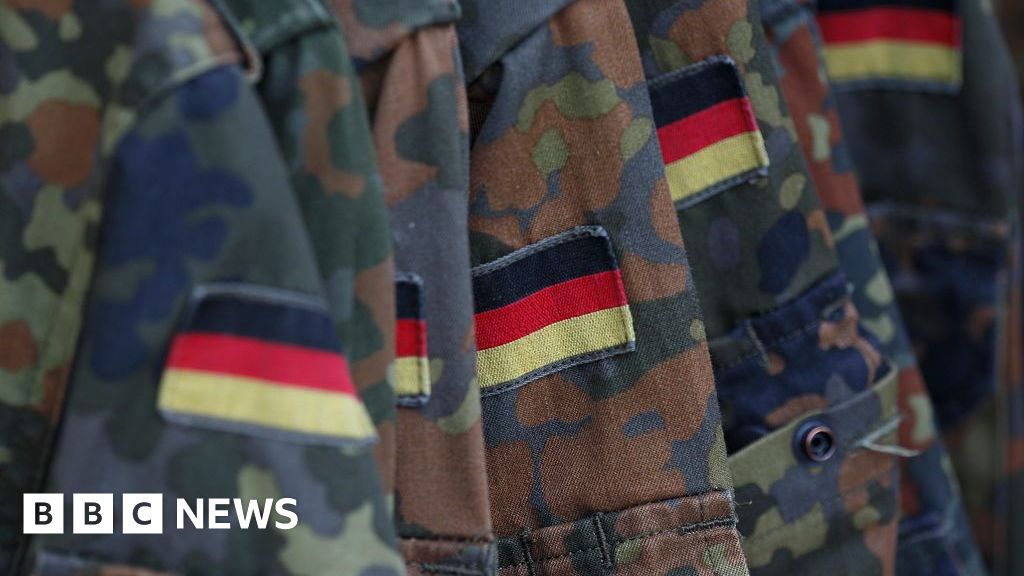The man, identified only as Thomas H, had been a captain in the army’s procurement office when he contacted Russian embassy in Berlin and passed on secret military information.
German police arrested him in the city of Koblenz in August and accused him of sharing photographs of munitions training systems and aircraft technology.
The 54-year-old admitted to a Düsseldorf court on Monday to passing information to Russia, saying it was a “stupid idea” and that he regretted his actions.
“It is the biggest mess I have ever made in my life,” he told the court.
Prosecutors said the man approached the Russian embassy in Berlin and the consulate in Bonn unprompted and “almost persistently offered himself to Russia”.
They said he photographed sensitive military files and dropped information through a letterbox at the consulate building in Bonn.
In a closing statement, the man said he had contacted the embassy after becoming concerned about the risk of nuclear war driven by Russia’s invasion of Ukraine.
He added that he was especially concerned that Germany’s supply of heavy weapons to Ukraine could draw it into the conflict. According to government figures, Berlin supplied about €6.6bn (£5.62bn) worth of military hardware to Ukraine in 2022 and 2023. This included 40 Leopard 1 tanks and 100 infantry fighting vehicles.
The man claimed that chronic overwork had impaired his ability to think critically about his actions.
His lawyer said he had been influenced by a stream of pro-Russian propaganda and disinformation that he had been consuming on TikTok and Telegram at the time. He noted that his client had also joined the far-right Alternative for Germany (AfD) party.
He added that the decision came during a four-day period “in which [his client] crossed red lines”.
While prosecutors said the leaks had revealed sensitive military information, they noted that he had not disclosed state secrets, an act which would have attracted a much heavier lifetime sentence.
The trial comes as a slew of Russian spy affairs have hit headlines in Germany.
In April, two men with dual Russian-German citizenship were arrested, accused of spying on US army bases in Germany where Ukrainian soldiers were being trained.
Since December, an employee for German domestic intelligence, Carsten L, has been on trial accused of passing on classified data to Russian agents.
And in February 2023, a former security guard at the British embassy in Berlin was sentenced to 13 years in prison for passing on large amounts of sensitive information to the nearby Russian embassy.
The affairs have sparked a debate about whether security measures in Germany are tight enough. The government has admitted that more cases are likely to come to light.
In a recent television interview, Justice Minister Marco Buschmann said that Germany was a target for foreign powers. He added that over the next few months, more spies were likely to be “unmasked”.



This is the best summary I could come up with:
German police arrested him in the city of Koblenz in August and accused him of sharing photographs of munitions training systems and aircraft technology.The 54-year-old admitted to a Düsseldorf court on Monday to passing information to Russia, saying it was a “stupid idea” and that he regretted his actions.
Prosecutors said the man approached the Russian embassy in Berlin and the consulate in Bonn unprompted and “almost persistently offered himself to Russia”.
In a closing statement, the man said he had contacted the embassy after becoming concerned about the risk of nuclear war driven by Russia’s invasion of Ukraine.
While prosecutors said the leaks had revealed sensitive military information, they noted that he had not disclosed state secrets, an act which would have attracted a much heavier lifetime sentence.
Since December, an employee for German domestic intelligence, Carsten L, has been on trial accused of passing on classified data to Russian agents.And in February 2023, a former security guard at the British embassy in Berlin was sentenced to 13 years in prison for passing on large amounts of sensitive information to the nearby Russian embassy.The affairs have sparked a debate about whether security measures in Germany are tight enough.
In a recent television interview, Justice Minister Marco Buschmann said that Germany was a target for foreign powers.
The original article contains 489 words, the summary contains 217 words. Saved 56%. I’m a bot and I’m open source!